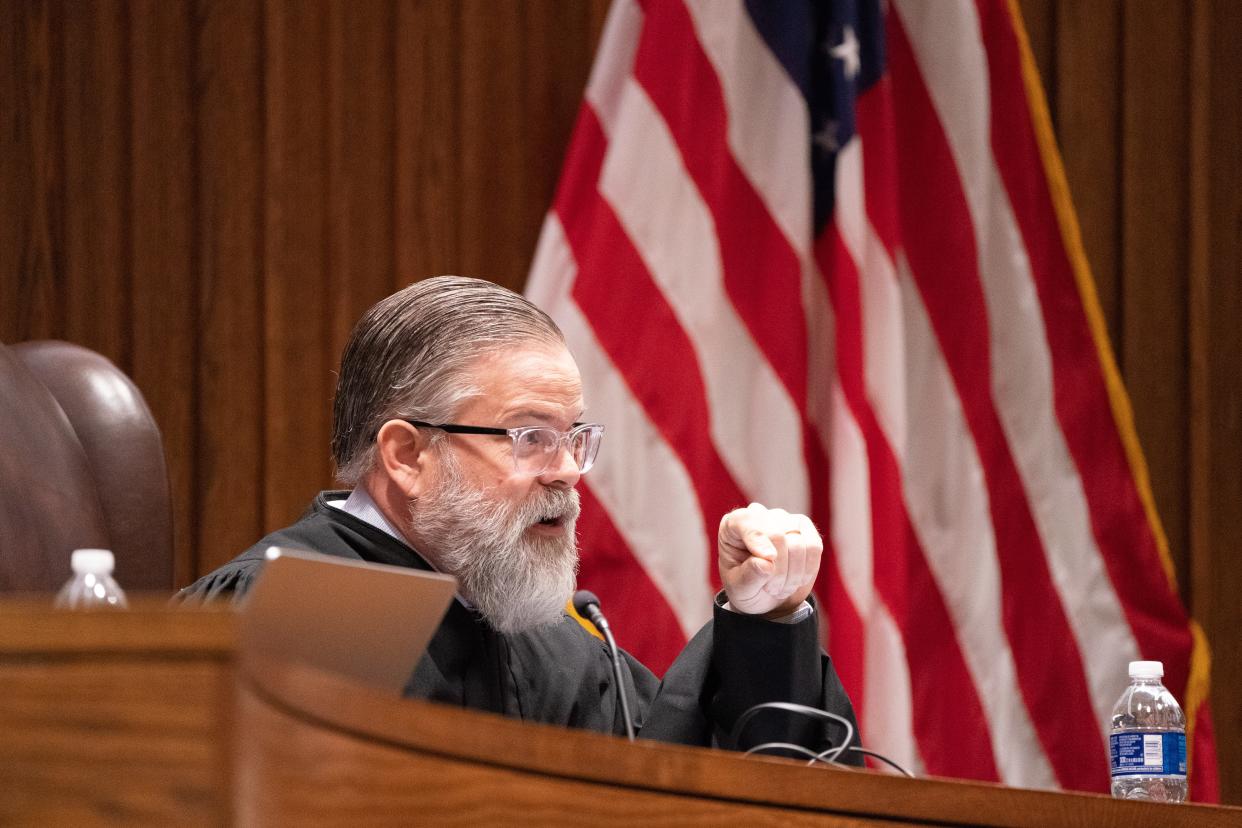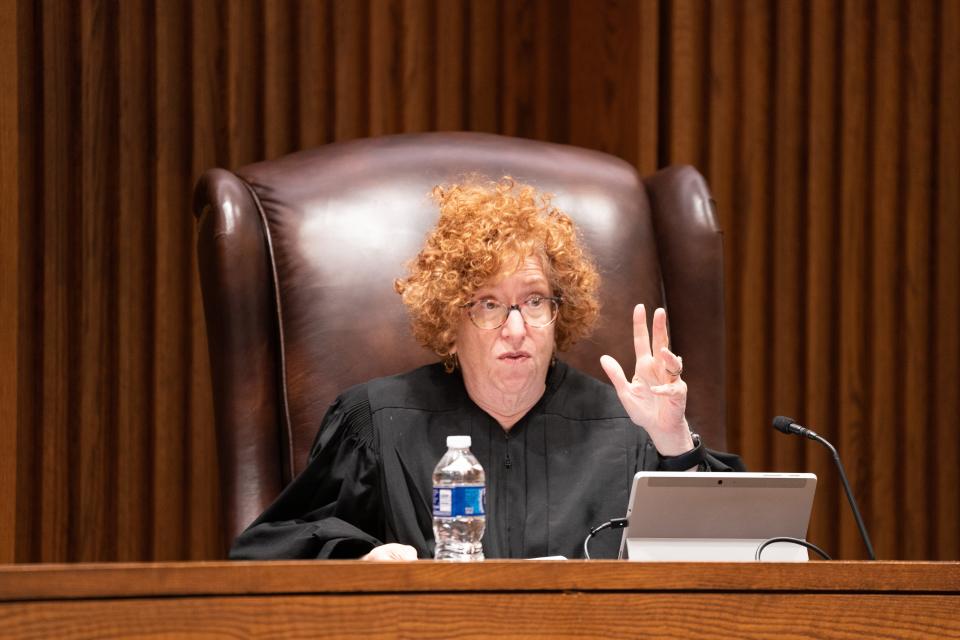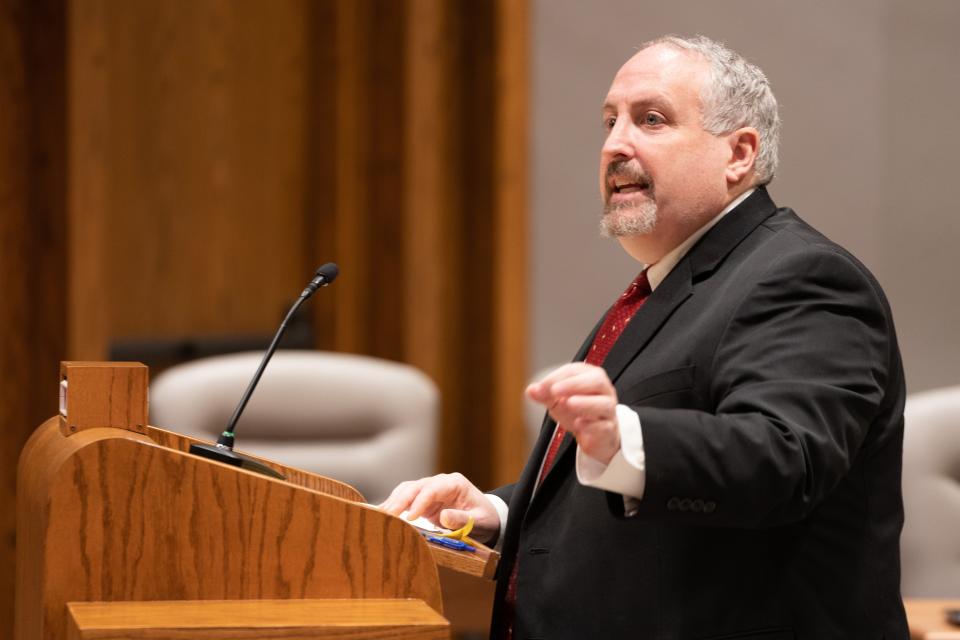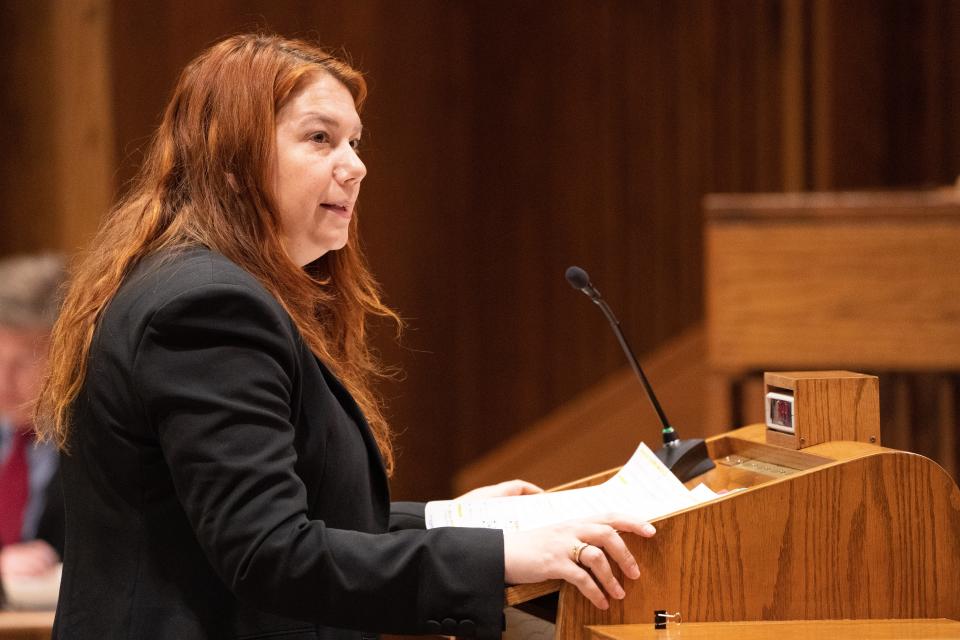Did Kansas criminalize voter registration drives? Supreme Court weighs election law case

- Oops!Something went wrong.Please try again later.
- Oops!Something went wrong.Please try again later.
Voter advocacy organizations are asking the Kansas Supreme Court to block a new state law that they argue criminalizes voter registration drives, despite lower courts rejecting the argument.
The justices of the state's high court indicated in Wednesday's hearing that their decision could hinge on the fact that legislators did not write a "reasonable person" standard into the law, appearing skeptical of the state's argument that such a standard should still be applied.
The Supreme Court's review focuses on a request for an injunction against a provision of HB 2183 that makes it a felony to impersonate an election official. Voter rights advocates say they halted voter registration drives out of fear of prosecution.
"They have severely curtailed their efforts," said Elisabeth Frost, an attorney from the Democrat-aligned Elias Law Group. "It is frankly absurd to suggest that they have brought this lawsuit and curtailed their activity for just the fun of it. They are afraid because the plain language makes them afraid."
Frost represents the League of Women Voters Kansas, Loud Light, Kansas Appleseed Center for Law and Justice, and Topeka Independent Living Resource Center. The groups are suing Republicans Secretary of State Scott Schwab and Attorney General Kris Kobach, arguing the law violates the Kansas Bill of Rights.
The state was represented by Hinkle Law Firm lawyer Bradley Schlozman, who was a top U.S. Department of Justice attorney under former Republican President George W. Bush.
"This case presents a completely manufactured controversy in which for inexplicable reasons plaintiffs are asking the court to interpret the statute in the most unreasonable manner possible in order to expose themselves to criminal liability," Schlozman said.
The election law, passed in 2021 by Republican supermajorities over Democratic Gov. Laura Kelly's veto, contained several provisions challenged in court. The matter before the Supreme Court is whether a preliminary injunction should be issued against part of the law creating a new crime of false representation of an election official.
Shawnee County District Court Teresa Watson ruled against the groups in September 2021. They appealed to the Kansas Court of Appeals, which ruled against the groups in June 2022, though one judge dissented.
The arguments from the voter advocates appeared to hold more sway over the Supreme Court justices.
How will the justices rule?

Justice Dan Biles recused himself from the case, so the ultimate decision will be decided by the six remaining justices.
Justice Caleb Stegall, the high court's most conservative member, took the lead on questioning Frost's arguments. But he also was the first to press Schlozman on his defense. He also sided with Chief Justice Marla Luckert in openly discounted a key piece of Schlozman's reasonableness analysis.
Justice K.J. Wall joined in questioning both lawyers on whether a reasonableness standard should be read into the law.
Justice Melissa Taylor Standridge appeared the most skeptical of Schlozman's arguments and opined that the appellate court "erroneously" applied an incorrect legal analysis in at least one area of its ruling.
Justice Evelyn Wilson suggested the law has a chilling effect.
Justice Eric Rosen asked Frost about the severability of the law if the court were to strike down the allegedly offending portion and confirmed that was the relief requested by the voter advocacy groups.
The court took the matter under advisement, meaning the six justices will discuss among themselves how to resolve the issues. There is no timeline for a decision.
Case likely hinges on reasonable person standard
The line of questioning from the justices indicate their decision may come down to whether a "reasonable person" standard exists in the statute, despite lawmakers not writing one in.
The law creates a new felony crime of false representation of an election official, which can be committed three different ways. The lawsuit challenges two: "knowingly engaging in" conduct that "gives the appearance of being an election official" or "would cause another person to believe a person engaging in such conduct is an election official."
The third way, which is not being challenged, requires "representing oneself as an election official."
The voter advocacy groups argue that sometimes people mistakenly believe their voter education, engagement and registration activities are operated by election workers, in part because of using official voter registration forms.
"A reasonable person might conclude that a person who is carrying documents that have official county insignias ... is an agent of the county," Stegall said.
"That's not what the statute says," Frost replied.
Nowhere in the statute did lawmakers write a "reasonable person" standard.
"It's just not in the statute. It's just not there," Frost said. "The Legislature obviously knows how to write a reasonable person standard. They do it all the time. They just didn't put it here. So this court can't read into the statute a reasonable person standard that isn't there."
She said the "plain text" of the law applies to voter registration activity, and to rule otherwise "is to rewrite the statute."
Schlozman's defense largely centered on a separate statutory definition for "knowingly," which incorporates a version of reasonableness. A second definition of "knowingly" does not, Wall noted.
Stegall told Schlozman "you can't rely on" the "knowingly" definition. Stegall said he agreed with Luckert's view that the definition is for a "reasonable speaker, not a reasonable listener."
"So what's your best argument that the statute contains or ought to be construed to contain a reasonable listener standard?" Stegall asked.
Schlozman said case law supports a court interpreting law will "apply it in a way that will ensure that it passes constitutional muster to the extent that's possible." He said: "You're not adding words. You're simply putting an interpretation of the statute in a way" to avoid "absurd results."
Bowler hats and Costco free samples

Stegall and Standridge attempted to apply Schlozman's defense to hypothetical scenarios.
In Stegall's, everyone thinks that wearing a bowler hat means you are an election worker. Under the law, "if I put a bowler hat on and walk outside, have I broken this law?" he asked.
Schlozman replied that in such a hypothetical where your actions are indistinguishable from that of an election official, "if you didn't undertake some sort of action to disabuse them, then we are potentially looking at a violation of the statute."
Stegall said the line of questioning was to show that "you need a reasonable person standard to save the statute."
Wilson continued the scenario.
"Don't I have a right to wear a bowler cap?" she said. "It's not my problem if you think I'm an election official."
Schlozman said that "the state obviously has a very substantial interest in protecting the public against confusion and people who are misrepresenting themselves."
He brought up "a common problem that we've encountered here in the state" of organizations mailing materials with "all of the hallmarks of coming from an election office."
"If I send a flyer that is from the secretary of state, why do I have to tell somebody I'm not the secretary of state?" Wilson said. "Don't I have the right to send a flyer? ... So your position is that I've committed a crime because I mailed a stamp, mailed a brochure, that is drafted by the secretary of state and didn't actively tell them I'm not the secretary of state."
Schlozman said yes, that would break the law.
"Don't you think that's pretty chilling?" Wilson asked.
"I think the state does have a substantial interest in protecting the public against that kind of misrepresentation," Schlozman said.
Standridge's hypothetical scenario used an independent contractor providing free samples of food at Costco who is asked by a customer where to find paper towels. In the past, customers have mistaken the free samples worker to be an employee of Costco. While the free samples worker isn't a Costco employee, they happen to know where the product is and so they tell the customer. In the scenario, it is a crime to impersonate a Costco worker.
"I'm knowingly engaging in this conduct, and I'm reasonably certain that someone is going to mistake me for a Costco worker, and so in order to avoid prosecution I'm not going to work there," she said.
Schlozman said that is why a reasonableness standard is necessary.
"The irony here is the conduct that my clients are engaged in is to help voters," Frost said. "They are not attempting to mislead anyone, and in fact they are facilitating their rights."
Are 2020 election deniers reasonable?

In arguing that applying a reasonable person standard protects voter registration drives, Schlozman invoked election deniers.
"In any society, there will be people who are really naive, who are willfully blind," Schlozman said. "We see that in the election deniers, I mean there's just there's some people you're just never going to convince."
Frost noted the election denier comparison and told the court it should not ignore that the law was passed amid widespread election denial.
"Election officials are regularly being harassed across the United States and threatened, and yet still the Legislature did not include a reasonable person standard," she said.
Standridge said millions of Americans and politicians believe the 2020 election was stolen.
"Is there a chance that that could be deemed a reasonable belief?" she said.
"Yes, I think your honor has hit one of the problems on the head," Frost said. "We are currently in a climate where lots of people believe what frankly I believe are unreasonable things, but lots of other people don't believe they're unreasonable, particularly when it comes to the activity of election officials and people who work in and around elections."
To make the point of whether a small number of people mistaking voter registration drive workers to be election officials would meet a reasonableness standard, Schlozman invoked the movie "Dumb and Dumber."
"The guy says, 'Hey, do I have a chance?' and she says, 'One in a million.' 'So you're saying I have a chance?'" Schlozman said.
He suggested the chance is one in 10,000, pointing to affidavits from the voter advocates saying some of the tens of thousands of people they have interacted with mistook them to be election officials. He contended they are an "apparently mind-reading telepath."
"With the threat of going to jail ... why would I at one out of 10,000 put my freedom at risk," Standridge said.
Stegall asked Frost, hypothetically, if the court struck down the law and the Legislature added a reasonableness standard, if it would address their concerns. Frost said they do have additional arguments.
"There are so many other issues with the statute," she said. "I think this is one that just needs to be stricken. And if the Legislature wants to try again, it can try again. But I don't think a reasonable person standard alone — it's certainly a very obvious problem with the statute — but alone, I don't think it gets you past all the constitutional hurdles here."
This article originally appeared on Topeka Capital-Journal: Kansas Supreme Court hears League of Women Voters election law case

